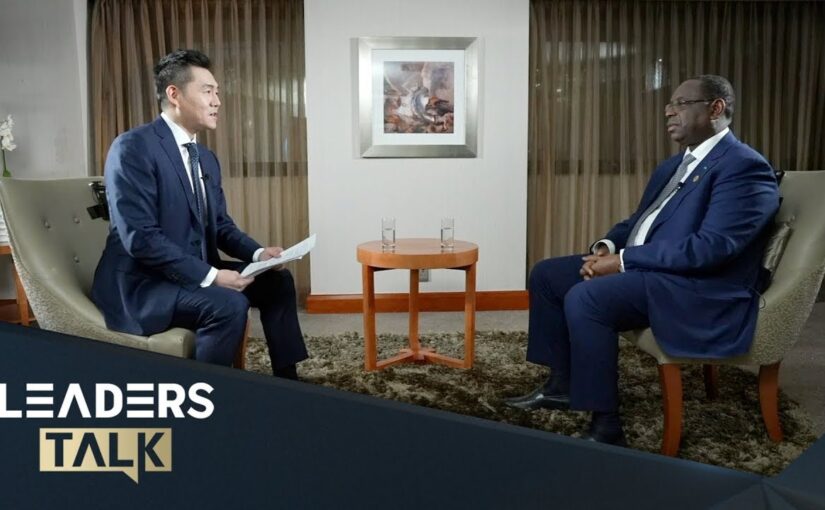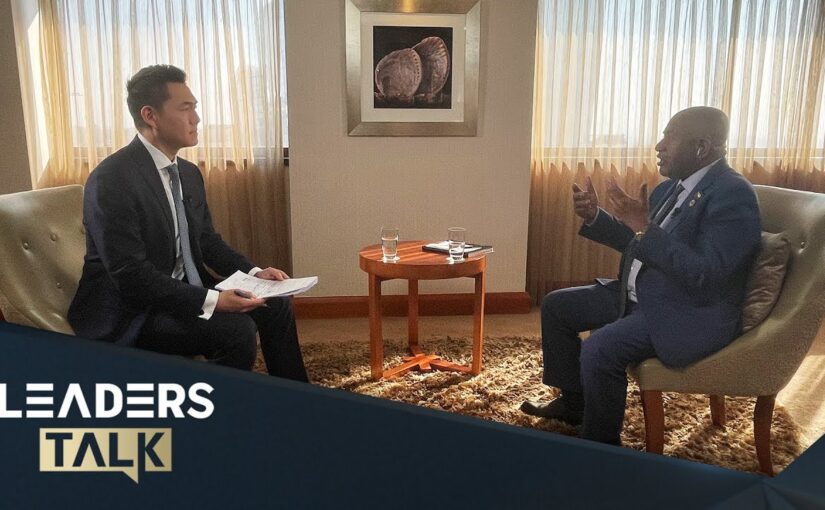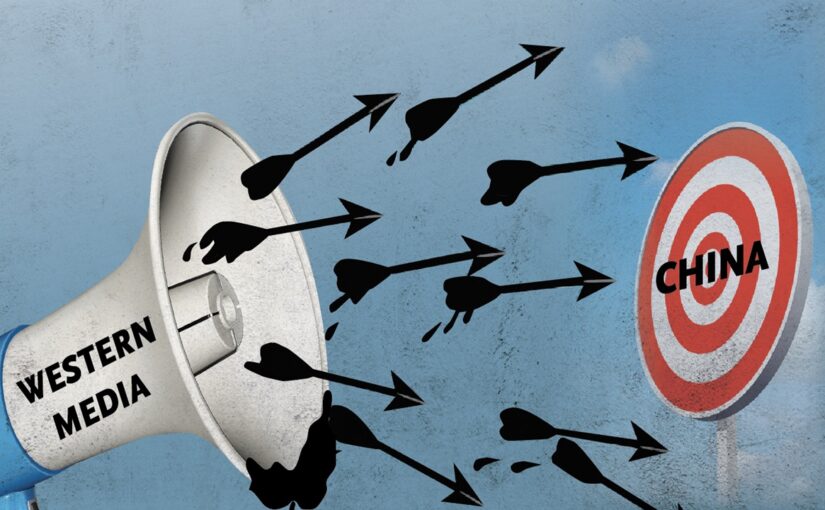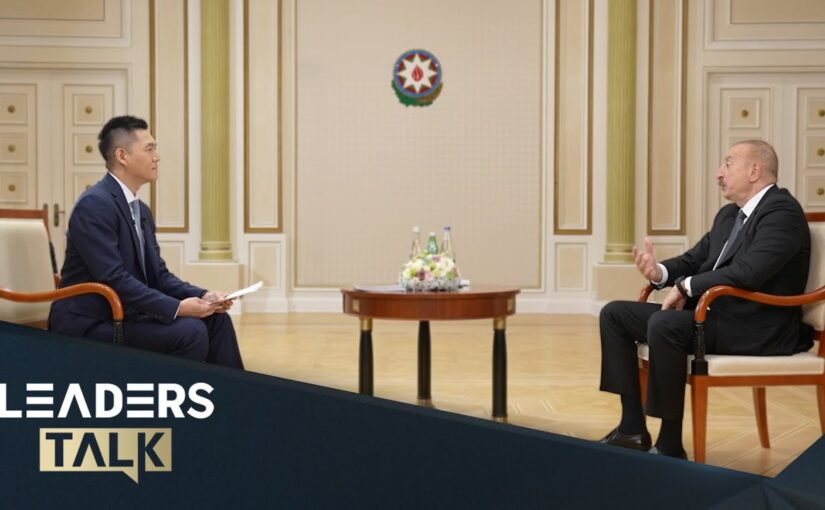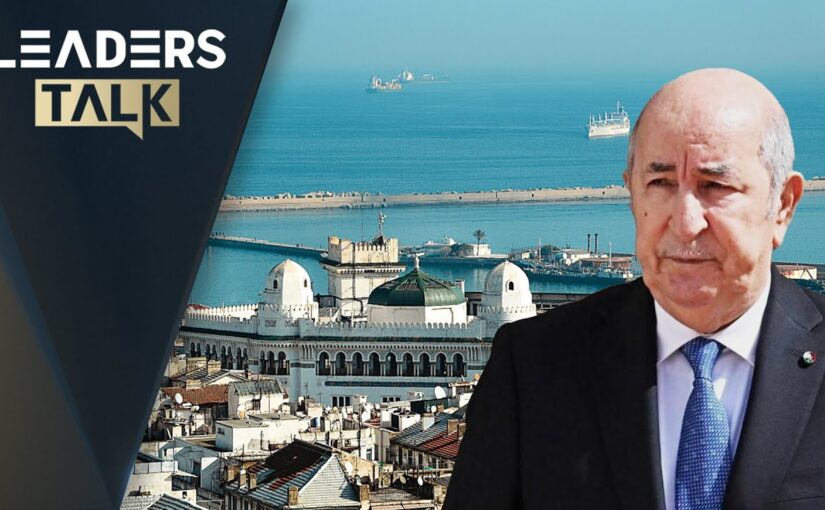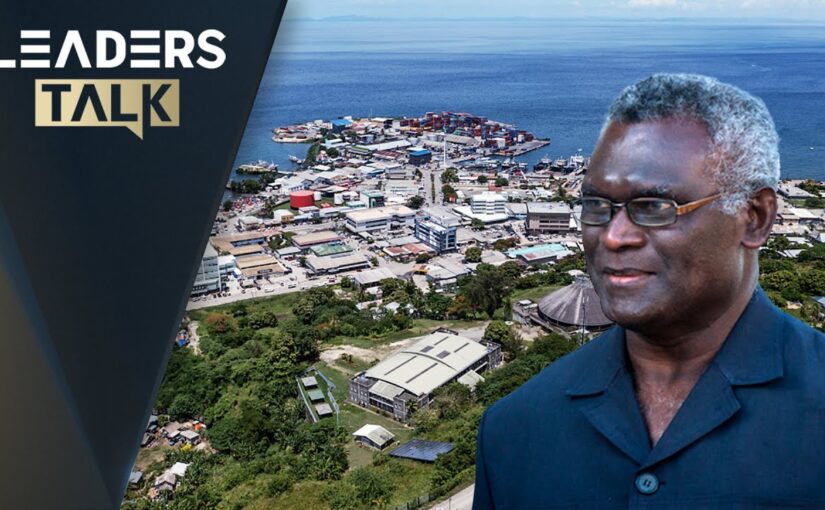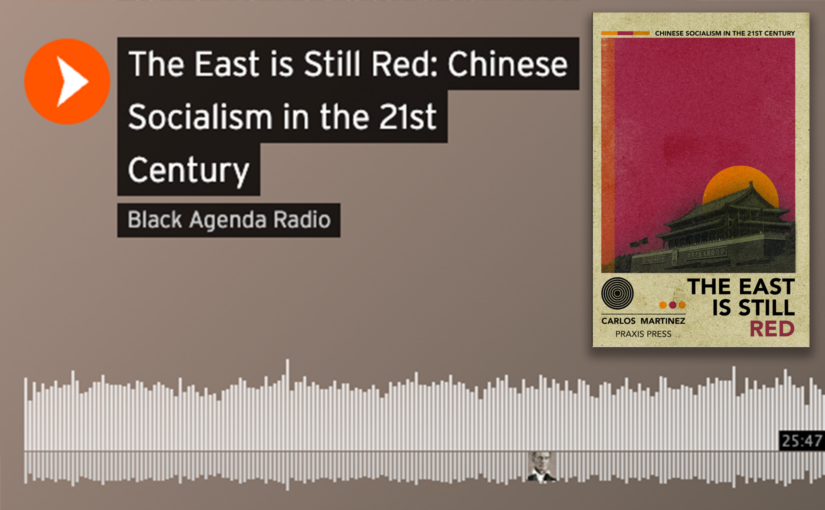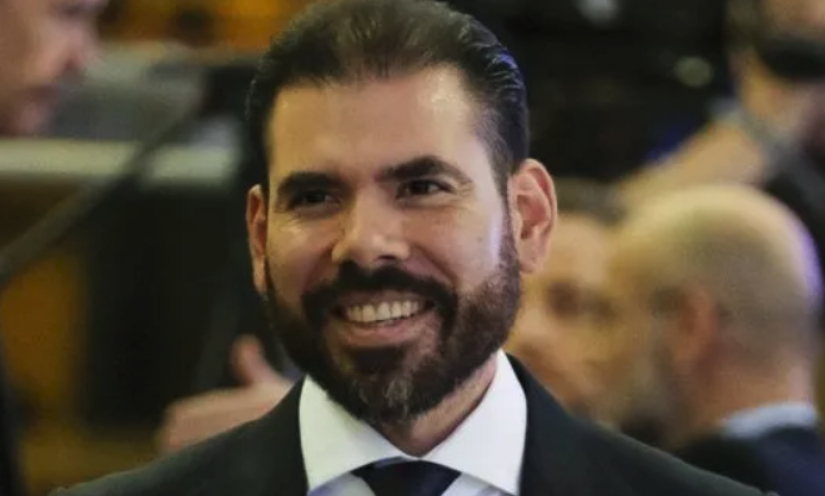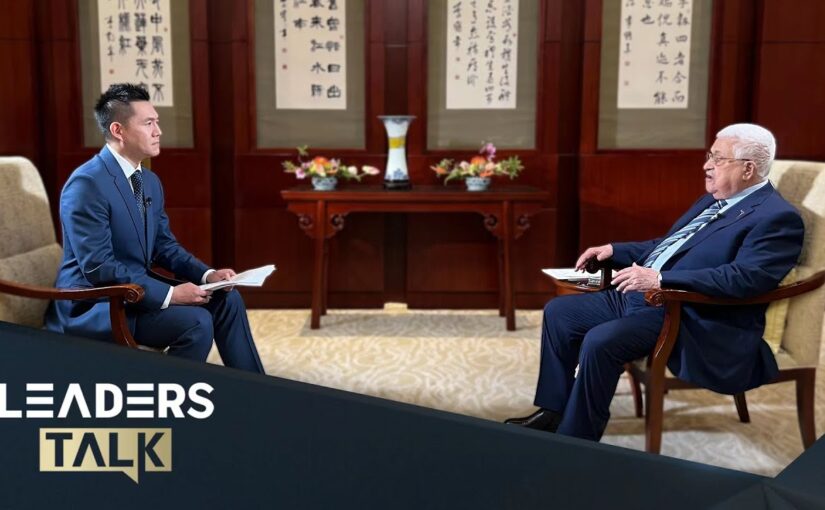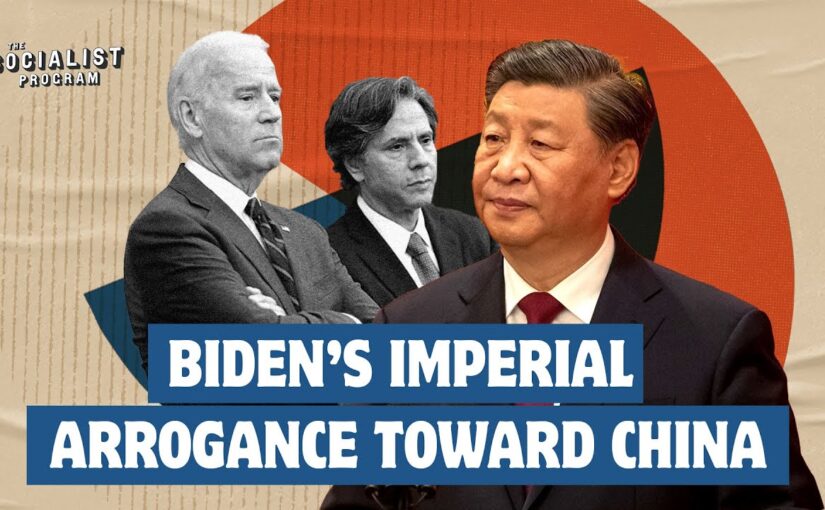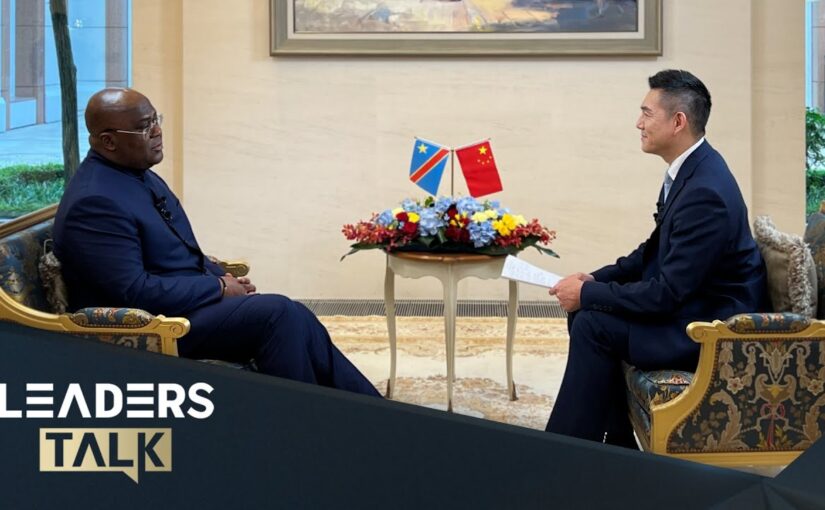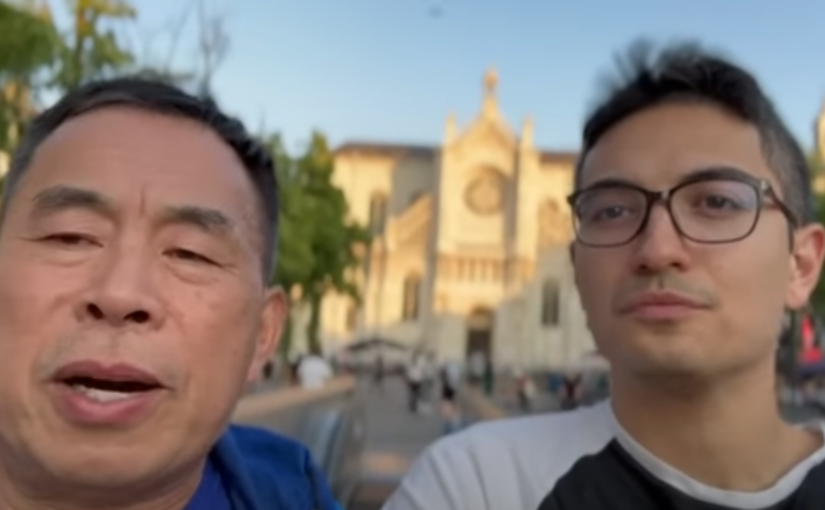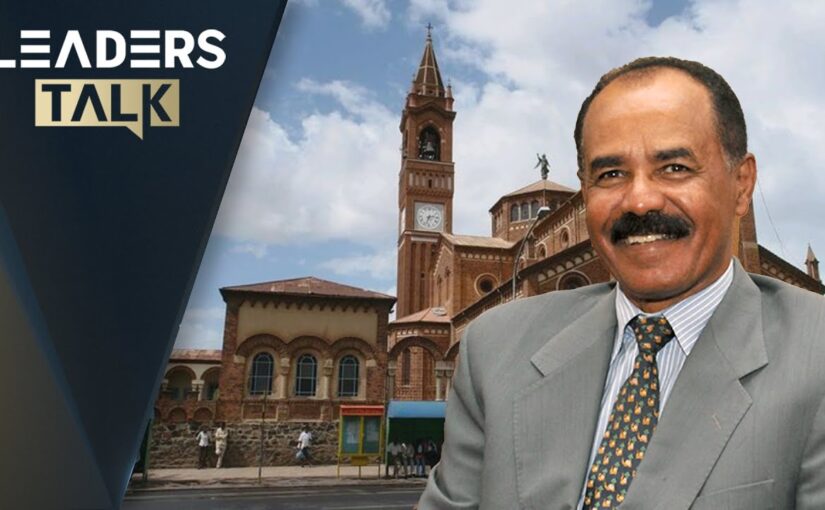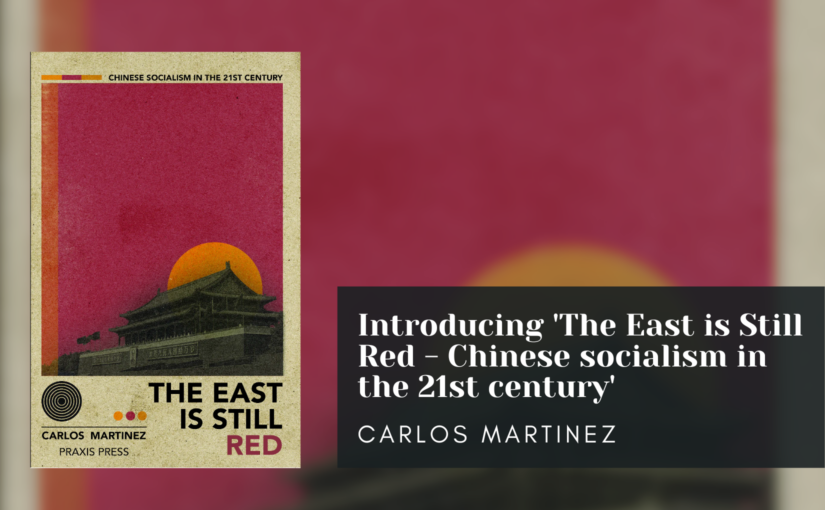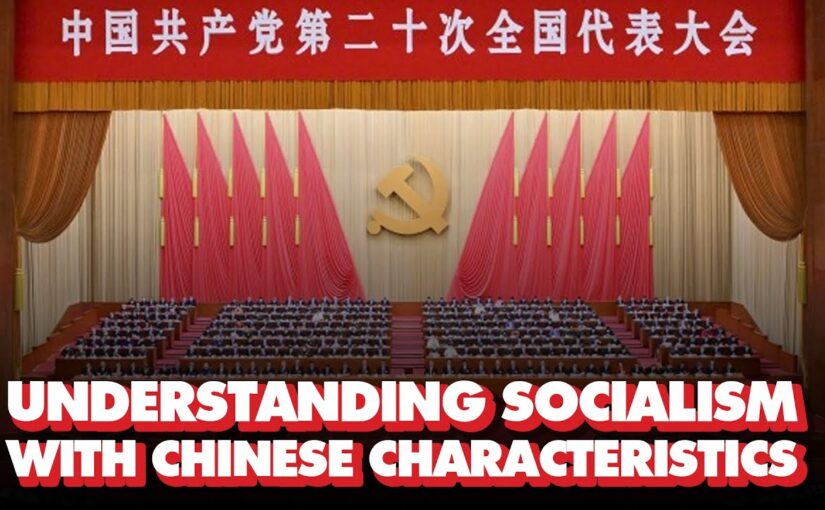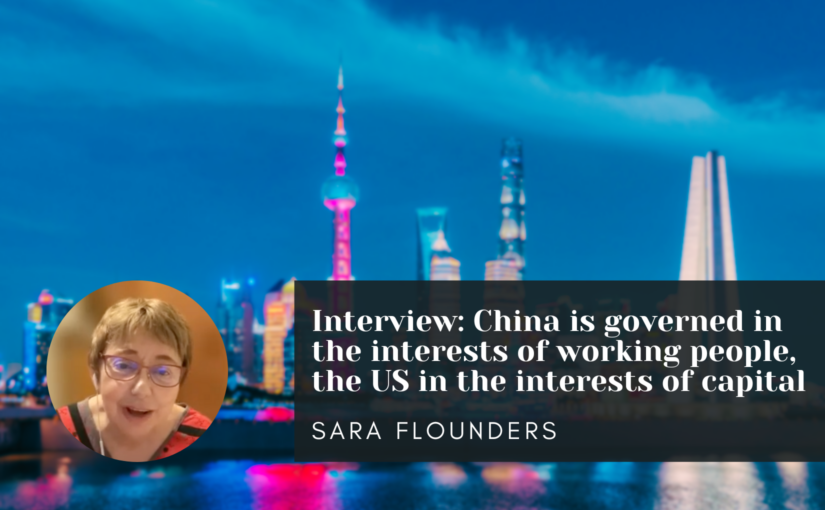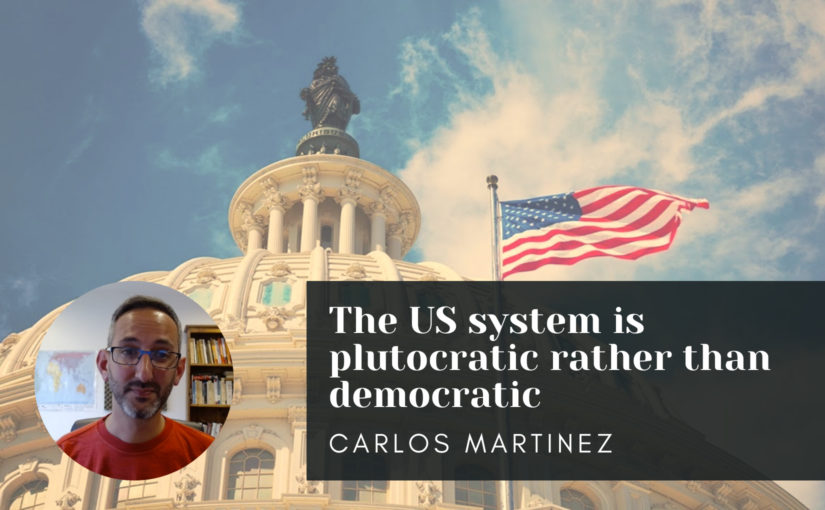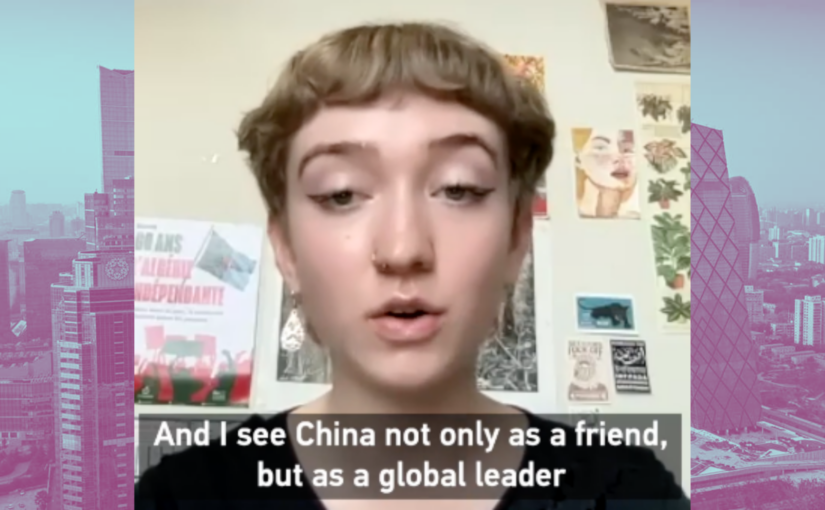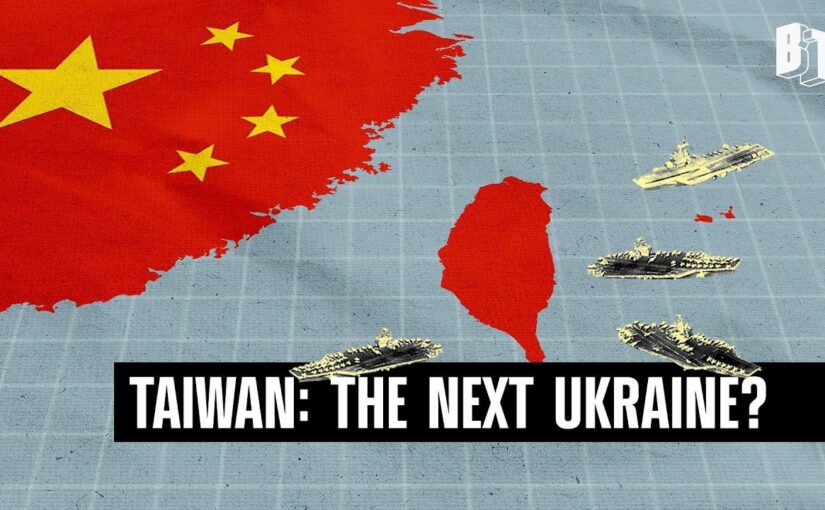In this episode of the CGTN series Leaders Talk, filmed in the South African city of Johannesburg immediately following the BRICS Summit and the China/Africa Leaders Dialogue held in its margins in August, Wang Guan interviews President Macky Sall of Senegal.
President Sall sets out a strong case for the reform of international institutions formed in the wake of World War II. The world has changed greatly since then and reform is demanded by Africa and the Global South as we are moving towards a multipolar world.
Senegal was the first country in West Africa to sign up for the Belt and Road Initiative (BRI) advanced by President Xi Jinping. President Sall extols his personal and friendly relationship with his Chinese counterpart and is full of praise for China’s relations with Africa.
China, he notes, once suffered aggression from the colonial powers, so today it shows empathy and humility in its dealings with others. Citing a recent discussion he held with French President Emmanuel Macron, he said that his message to Africa’s other partners is that we want the same from them. There is now a generation, including himself, born after the end of colonial rule, and they have a new mentality.
Turning to questions of development financing and foreign debt, Sall makes the point that China’s financing is based on requests made by Africa and priorities set by Africa. Refuting ideas of a ‘Chinese debt trap’, he notes that Africa’s debt to China is only some 12% of its total. Moreover, the interest rate is low, at a maximum of 2.5%, with a minimum repayment period of 20 years, and a grace period before payments become due that is generally longer than that offered by others.
Furthermore, citing a China-built expressway in his country as an example, because China’s projects are built quickly, they can often be generating revenue for a few years before any loan repayments fall due.
The full interview with President Macky Sall is embedded below.
Category: Interviews
Comorian President Azali Assoumani: Africa can rely on China
In this episode of the CGTN series, Leaders Talk, Wang Guan interviews Azali Assoumani, President of the Union of the Comoros, who is also this year’s rotating Chair of the African Union (AU). The president of the Indian Ocean island country was interviewed in South Africa’s largest city, Johannesburg, where he was attending the BRICS Summit in late August, alongside the related China/Africa Leaders Dialogue.
President Assoumani was very positive both about the role in international affairs currently being played by the BRICS cooperation mechanism as well as for the prospects of an expanded BRICS Plus, which was first proposed by China. Citing the two examples of the disproportionate control exercised by the western powers over the traditional international financial institutions, as well as the allocation of Covid vaccines, he notes that he had discussed the latter issue with his South African counterpart Cyril Ramaphosa several times. Africa, he points out, has the ability to produce its own vaccines, an area where South Africa, Senegal, Morocco and Egypt, among other countries, have already taken a continental lead.
The Comorian leader was also emphatic on the need for industrialisation, so that Africa can export finished goods and not just raw materials. While the era of political colonialism may be largely over, that of economic colonialism is not. Often Africa exports raw materials and then imports finished goods made from them at ten, twenty or even thirty times the original export price. He therefore endorses the priorities China has set for its economic cooperation with Africa, namely industrialisation, agricultural modernisation and upscaling of the African workforce.
On agricultural modernisation, he highlights the centrality of both food processing and storage, the latter being of particular importance given the propensity of many African countries to drought and to resultant famine.
The president is also an advocate of the growing trend towards dedollarisation. Noting the successful development of the BRICS-initiated New Development Bank (NDB), he says this shows that BRICS countries could also find their way towards a common currency.
Assoumani praises China’s long standing commitment to Africa and notes that the Asian country has been fuelling Comoros’ deveopment. China was one of the first countries to recognise Comoros when it finally won independence from French colonial rule in 1975. China has always supported and stood by Comoros, he says. Therefore Comoros must also do everything it can to support China. Drawing on a popular Comorian saying, he asserts that China is now becoming a wall on which not just his country, but Africa and indeed the whole world can rely.
Africa and China, he notes, have a bond of brothers. Some other countries may be jealous of this relationship, but they, too, could enjoy a similar relationship if they treated their African counterparts as friends and brothers.
Located at the northern end of the Mozambique Channel in the Indian Ocean, Comoros consists of four main islands and numerous smaller islands. However, France remains in colonial occupation of Mayotte, one of the major islands, making this issue part of the unfinished business of African decolonisation. France has even vetoed UN Security Council resolutions that would affirm Comorian sovereignty over the island. The CGTN commentary correctly refers to Mayotte as part of the sovereign territory of the Union of the Comoros.
The full interview with President Assoumani is embedded below.
Dilma Rousseff: China’s poverty alleviation a historic event in the story of human development
In this edition of the CGTN series, Leaders Talk, conducted in May but only recently screened, essentially coinciding with the BRICS summit in South Africa, Zou Yun interviews Dilma Rousseff, former President of Brazil and now President of the BRICS-initiated New Development Bank (NDB). The interview was recorded at the bank’s Shanghai headquarters. As President of Brazil in 2014, Dilma was one of the signatories to the founding document of the bank.
Dilma explains how developing countries and emerging markets of the Global South need investment, for example in physical and digital infrastructure so as to improve their people’s lives. But they suffer from problems such as a lack of access to credit and the non-convertibility of their currencies. The latter, in particular, contributes to reinforcing dollar hegemony, which adversely affects them, whether in terms of susceptibility to changes in US interest rates or the US propensity to arbitrarily impose sanctions and exercise ‘long-arm jurisdiction’, seeking to impose US domestic legislation on others. Therefore, conducting at least a portion of external trade in local currencies is vital. It is related to the development of a multipolar world.
According to Dilma, the US’ imposition of punitive tariffs on China is a grave mistake. Not only does it cause economic problems for China – it fragments global supply chains and impacts economic growth in a way unfavourable to all countries. She notes that 40 years ago, China was an impoverished country, but today it is the world’s second greatest economy. US tactics such as ‘friend shoring’, she notes, can be no substitute for China’s huge market.
Regarding US sanctions policy, Dilma insists that they are effectively just another form of war. Their aim is to prevent development and negatively impact the lives of the people, with the aim of triggering a change of system.
In contrast, she expresses her strong support for the series of international initiatives put forward by President Xi Jinping, which she considers have peace and development at their core. She further describes Xi as a great leader, who has appeared at the right time and place. During her term of office, and under President Lula, Brazil succeeded in lifting 36 million people out of absolute poverty. She knows the challenges that had to be met to achieve that, so lifting 800 million people out of poverty, as China has done, is a historic event in the story of human development.
The full interview with Dilma Rousseff is embedded below.
Global Times interview with Carlos Martinez
What follows below is the full text of a written interview of Friends of Socialist China co-editor Carlos Martinez, conducted by the Global Times.
The interview deals with a wide range of issues, including the New Cold War on China, the nature of Chinese socialism, the Belt and Road Initiative, capitalist versus socialist democracy, and anti-China propaganda in the Western media.
An abridged version was published in the Global Times on 31 August 2023.
Could you please briefly introduce yourself to us? When did you start to study China? And what made you start to be interested in the country?
I’m an author and campaigner from London, Britain, with a longstanding interest in the socialist countries and global anti-imperialism. My first book, released in 2019, was about the reasons for the collapse of the Soviet Union. I was involved in setting up the No Cold War campaign in 2020, and the Friends of Socialist China platform in 2021.
There were two main motivations for me to start studying China. The first comes from being a Marxist and wanting to understand how socialism is constructed in the real world. The second comes from being anti-imperialist and anti-war, and wanting to understand China’s role in the development of a peaceful and multipolar world.
The more I study China, the more I realise how poorly it’s understood in the West. In recent years, the anti-China propaganda in the media has been increasingly intense, corresponding to the rise of the US-led New Cold War. Many people have this absurd idea of China as some sort of authoritarian dystopia that’s intent on taking over the world. Many people believe the media’s disgraceful slanders about the suppression of human rights in Xinjiang, and so on.
China is misunderstood even on the left: lots of people believe that, because China uses market mechanisms, or because there are some very rich people in China, that it can’t be socialist any more. But then how do we explain China’s achievements? China has raised living standards beyond recognition; it’s become the world leader in renewable energy; it’s gone from being a poor and backward country to being a science and technology powerhouse; it’s leading the global shift to multipolarity; its life expectancy now exceeds that of the US. All this is historic and unprecedented progress, on a scale which has never been achieved by any capitalist country. Why on earth would the left want to attribute these successes to capitalism rather than socialism?
Continue reading Global Times interview with Carlos MartinezAzerbaijani president: Belt and Road an important contribution to Central Asia’s development
In this recent episode of the CGTN series, Leaders Talk, Wang Guan, travels to the Azerbaijani capital, Baku, to sit down with President Ilham Aliyev.
He notes that this year is the 100th birth anniversary of the current president’s father, former President Heydar Aliyev, who is, it is noted, not only the founding father of independent Azerbaijan, but also of China-Azerbaijan friendship.
President Aliyev emphasises that his father created a framework for cooperation with China based on mutual respect and friendship. And, as illustrated in photos shown by Wang Guan, during his China visits, Heydar Aliyev also took particular care to visit ordinary Chinese families and to learn about their daily lives.
President Aliyev noted that his father was already well aware of developments in China from the time when he served in the Soviet government. In the history of the Communist Party of the Soviet Union (CPSU), Heydar Aliyev held the highest position ever attained by someone of Muslim heritage.
The current president considers the relations between China and Azerbaijan to be on a long journey of strategic cooperation. They are based on an alignment of major positions in international relations, for example with regard to sovereignty, territorial integrity and non-interference in internal affairs.
All this also helps to create a favourable backdrop for economic cooperation, particularly within the framework of the Belt and Road Initiative (BRI), which, in turn, contributes to regional security, stability and development. The progress of the BRI enables Azerbaijan to leverage its geographical location to its advantage, through the development of both the Caspian seaport and international rail links.
Noting that he has met President Xi Jinping on many occasions, both in China and at international gatherings, Aliyev describes his Chinese counterpart as a person of vision and intelligence. This, he notes, contributes to the fact that the number of international friends of China is growing year by year.
Aliyev also praises China for the assistance it provides to other countries, particularly when other countries refuse to do so. For example, China was the only country to supply Covid-19 vaccines to Azerbaijan when they were first developed. His letter to President Xi drew an immediate response, making Azerbaijan one of the first countries to start a vaccination programme during the global pandemic.
With regard to the question of Taiwan, he said that Azerbaijan always supports China’s territorial integrity and reunification. HIs country’s support for the one-China principle is absolutely unchanged and will never be changed.
Turning to negative western perceptions of developing countries like China and Azerbaijan, Aliyev says that the basic reason is his country’s pursuit of independent policies based on the national interest. Besides the western media, President Aliyev also excoriated the role played by supposedly independent NGOs such as Human Rights Watch and Amnesty International, noting that their agendas did not diverge from those of their funders.
The full interview with President Aliyev is embedded below.
Algerian President: No matter how the world changes, our friendship with China will remain unchanged
Algerian President Abdelmadjid Tebboune paid a state visit to China, from July 17-21 2023. During this visit, shortly after his meeting with President Xi Jinping, he sat down with CGTN’s Li Tongtong to record an episode of the channel’s Leaders Talk series.
The Algerian leader began by expressing his people’s “sincere admiration for the great nation of China.” Algeria and China, he noted, share a similar history of development. Both of them started from scratch. Algeria endured 130 years of colonialism, but friendly countries like China helped both during the struggle for national liberation and when embarking on the road of development.
Li Tongtong noted the emotional way in which Xi Jinping had recalled how the two countries had stood together against imperialism and colonialism.
China was the first non-Arab country to recognise the Algerian provisional government, 65 years ago, at the height of the liberation war. China’s very first overseas medical team was sent to Algeria in 1963 – they were the first foreign doctors to reach the newly liberated country, which was then in dire need of medical assistance. In 1971, together with Albania, Algeria was the key sponsor of UN Resolution 2758, which restored China’s UN seat to its legitimate government.
President Tebboune said that China and Algeria had shared the same experiences. China had suffered from war, poverty and famine, but the indomitable Chinese people, under the leadership of revolutionaries like Chairman Mao Zedong, had fought hard for a better future and now China stands tall in the world.
Beijing’s action, in recognising the Algerian provisional government, he continued, had helped his country to win a complete victory in the war of liberation, and to embark on a new journey hand in hand with friends like China.
President Tebboune expressed great confidence in Xi Jinping, who he described as a wise leader. The weight on his shoulders is immense. China’s new path of development has implications for the whole world and many countries are looking to China. Algeria wholeheartedly supports him.
Algeria, which was the first Arab country to enter into a comprehensive strategic partnership with China, and which joined the Belt and Road Initiative (BRI) in 2018, is seeking to deepen its economic cooperation with China, which has long been its main partner in infrastructure development and other areas. One plan is for a railway to link the north and south of this vast country. Algeria’s first satellite, itself the first product of Sino-Algerian aerospace collaboration, is proudly featured on an Algerian banknote.
According to President Tebboune: “True friends step forward in times of adversity. So we are very clear about who our friends are and who are not. No matter how the world changes or what difficulties we face, our friendship with China will remain unchanged.”
Algeria, he noted, explaining the basis of his country’s regional and foreign policy, had struggled for national liberation, justice and freedom, and this had entered deep into the Algerian people’s subconscious. The Algerian people had paid a heavy price for these ideals. Fifteen percent of the total population at the time had sacrificed their lives in the national liberation war. So Algeria is very clear – it supports national liberation and rejects hegemonism of any kind. Some powers were now pursuing attempts at neo-colonialism, but the African peoples, he said, have awakened.
Referring to last November’s reconciliation agreement between 14 Palestinian factions, including Fatah and Hamas, which was brokered in Algiers with his country’s mediation, President Tebboune said Algeria pursued no selfish interest in this. Palestine’s strength lies in unity. The older generation of his country’s leaders had said that Algeria’s independence would be incomplete without the independence of Palestine and his country always adhered to this.
Algeria is striving for a multipolar world together with China and looked forward to joining the BRICS cooperation mechanism and its New Development Bank.
The full interview with President Tebboune is embedded below. Our previous report on his state visit to China can be read here.
Solomon Islands PM: establishing relations with China one of the best decisions in our history
In this episode of the CGTN series Leaders Talk, Zou Yun interviews the Prime Minister of Solomon Islands Manasseh Sogavare at the start of his second official visit to China in July. Sogavare came to China nearly four years after his previous visit, which marked the establishment of diplomatic relations between the two countries. This time, he officially opened his country’s embassy in Beijing and the two countries formally established a Comprehensive Strategic Partnership of Mutual Respect and Common Development in the New Era. When asked how he felt to be visiting China again, he simply says: “It’s good to be back home.”
Solomon Islands finally won independence from British colonial rule in 1978, but Sogavare repeatedly describes the decades between the proclamation of independence and the establishment of diplomatic relations with China as ones of “wandering in the wilderness”. This strikingly biblical phrase doubtlessly reflects his own Seventh Day Adventist faith, as well as the deep religious sentiments of the Solomon Islands people as a whole, and therefore, in turn, his deep attachment to the China relationship, which, despite being just under four years old, has been on the fast track to become a model of solidarity, cooperation and joint development between large and small countries and between developing countries. For Sogavare, the establishment of diplomatic relations was one of the best decisions made in his country’s history and he praises the attitude he ascribes to President Xi Jinping that, “no country is too small; no one comes too late.”
In the very short history of diplomatic relations between his country and China, Sogavare asserts that the achievements have been huge, not least China’s provision of the national stadium, where Solomon Islands will host the Pacific Games this year. He expresses himself vehemently with regard to those countries who have criticised his relations with China, saying that, “we are a sovereign state and who we have diplomatic relations with and who we develop cooperation with is no one’s business.” He dismisses the theory of a ‘Chinese debt trap’ as “nonsense”, saying that some countries are afraid that they are losing their grip over the small island states.
Establishing relations with China was the best decision because his country is struggling for development. Decades after independence, Solomon Islands is still aid dependent and the country is still poor, despite its immense resources and potential, including in forestry, marine resources, minerals and tourist attractions. Unless his country realigned itself to open up to the opportunities provided by China, he feared it would remain poor forever. Asked about his impressions of President Xi Jinping, he singles out his leadership in lifting the Chinese people out of poverty. This does not simply happen by chance and is something that other countries should emulate.
As the leader of a Pacific Island country, and home to some of the world’s greatest diversity of corals and coral reef species, Sogavare expressed serious and grave concern with regard to both the Japanese plan to release contaminated water from the Fukushima nuclear reactor into the ocean and the AUKUS agreement between Australia, the UK and the US that will see the introduction of nuclear powered submarines into the South Pacific. The South Pacific countries had jointly sent the Prime Minister of Cook Islands to Japan to convey their concern.
Regarding the AUKUS agreement, he explained that the first he had heard of this was on the media – the countries concerned had not even had the courtesy to inform Solomon Islands. This is despite the fact that both Australia and Solomon Islands are signatories to the 1986 South Pacific Nuclear Free Zone Treaty, also known as the Treaty of Rarotonga. The South Pacific, he says, is very clear on its nuclear free policy, citing the impact of the nuclear tests on Moruroa (a part of Polynesia still under French colonial rule) and the continued suffering of the people there.
Finally, Prime Minister Sogavare speaks of his personal admiration for the Chinese martial arts icon Bruce Lee. Himself a Second Dan (black belt) in the Japanese Shotokan school of karate, it was Bruce Lee who inspired him to take up the martial arts seriously and the Prime Minister recalls how meaningful it was for him to visit Lee’s Hong Kong home in 1997.
The full interview with Prime Minister Manasseh Sogavare is embedded below.
Is the East still red? Interview with Carlos Martinez on Black Agenda Radio
In late June 2023, Margaret Kimberley hosted Friends of Socialist China co-editor Carlos Martinez on Black Agenda Radio to talk about Carlos’s recently-released book, The East is Still Red: Chinese Socialism in the 21st Century.
The two discuss a number of topics, including the rationale for the book’s name; the issue of whether or not China is a socialist country; the reasons behind China’s phenomenal economic rise; the escalating New Cold War; China’s foreign policy; and more.
Nicaragua’s new mutually beneficial relations with China
In the following interview with journalist Erving Vega, Laureano Ortega, the Adviser to the President of Nicaragua for Investment Issues, International Trade and Cooperation, provides an overview of the wide scale and broad reach of the cooperation between China and Nicaragua, since the two countries re-established their diplomatic relations in December 2021.
Laureano, who played a key part in the negotiations on resuming diplomatic relations, affirms that “it is important to frame where this cooperation comes from; first of all, we reiterate that this comes from the historical relationship of two brother parties, the Sandinista National Liberation Front Party and the Communist Party of China, and then, in an ideological and political affinity, of shared objectives.” He explains that Nicaragua fully supports all the important initiatives put forward by Chinese President Xi Jinping, such as the Belt and Road Initiative, Global Development Initiative, Global Security Initiative and Global Civilization Initiative, noting that: “In these turbulent times in the world, these proposals, that have emerged from President Xi Jinping give us a light, a hope, a path of hope, a guide on how to achieve fair development and equal and respectful treatment by the international community. That is very important.”
The interview was conducted the day after work began on a Chinese project to build 12,000 new homes for social housing in the Nicaraguan capital, Managua. This is just one of numerous projects agreed during a visit from the President of the Chinese International Cooperation Agency for Development, which “will give great benefits to the Nicaraguan people.”
Noting how China had previously provided Nicaragua with three million vaccines to fight Covid-19, along with respirators, materials for the neonatal sector and other much needed equipment, Laureano outlines other areas of his country’s collaboration with China, including donations of wheat and fertilizers, scholarships for Nicaraguan university students, cultural exchanges, renewable energy, telecommunications, infrastructure, mining, and fisheries. “We see that the Chinese comrades work as we do, with a deep sense of social commitment, with a deep sense of humanism, of humanity, and it is not only for mercantilist profit, but there is truly a work that is of mutual benefit: ‘If you do well, I do well too’.”
The two countries are making rapid progress on a Free Trade Agreement, which is expected to enter into force next year.
The interview was originally published in Spanish by Tortilla con Sal. This version was published in English translation by Chicago ALBA Solidarity.
Nicaragua’s Housing Program with China is Building 12,000 New Homes
Laureano Ortega: Yesterday we inaugurated the first phase of the Housing Program, which is a first step, a very significant emblematic step, because it is the first Social Benefit Infrastructure Program to be developed in Nicaragua, with the cooperation of the People’s Republic of China.
The first step I say, because during the visit of the Chinese International Cooperation Agency for Development we have reviewed a large portfolio of projects, so that the prospects for cooperation with them are very large and that will give great benefits to the Nicaraguan people.
Erving Vega: We are motivated by the interview precisely to learn or go into a little more depth about this visit. A large Chinese delegation headed by the President of the Cooperation Agency was in the country this weekend [April 15-16]. What did they talk about? What are the topics on the agenda? And in this context the inauguration or launching of the Project; I say huge because we are talking about more than 12,000 houses.
LO: That’s right. It is a huge Project for Nicaragua because everything, of course in its due proportion, historic because of what it symbolizes. But it is also enormous because of the benefits, the number of families that will benefit, the Decent Roof that our Nicaraguan families, not only in Managua, but also in Chinandega, Estelí, Rivas, Masaya, Leon, the cities that are part of the program that will be developed over the next few years, as it should be, with these infrastructure programs that also take time of formulation and execution, to make them well, to make them right.
Continue reading Nicaragua’s new mutually beneficial relations with ChinaCGTN interview with Palestinian President Mahmoud Abbas
In this latest instalment of the CGTN series, Leaders Talk, Wang Guan interviews Palestinian President Mahmoud Abbas during his recent state visit to China.
Abbas says that that the upgrading of relations between China and Palestine to that of a strategic partnership this time is of great significance. It is a good fortune to the Palestinian people that China always firmly stands on their side and provides assistance to them. Agreements reached during this visit include major projects in economy, agriculture, sister city programs, and so on.
The Palestinian leader regards China’s brokering of reconciliation between Iran and Saudi Arabia, and the resulting steps to resolve other disputes, both long-standing and more recent, in the region, as a miracle, adding that all Arabs are pleased with China’s efforts.
In response to his interviewer’s observation that the Palestinian issue is at the heart of Middle Eastern politics, but no progress has been made in its resolution due to the unbalanced US position, Abbas notes that Israel has discussed a ‘two-state solution’ but not enacted it. The US, he explains, acts as a roadblock, with little interest in solving the Palestinian issue. However, the United States also once refused to recognise Nelson Mandela and supported the racist policy of apartheid in South Africa, but they eventually capitulated and changed their stance.
Asked for his impressions of Chinese leader Xi Jinping, Abbas described him as a dear friend, both to himself and to the Palestinian people – a man who keeps his promises and never resorts to empty talk. Palestine, he continued, stands with China on the Taiwan issue. “If any country opposes China, we will resolutely oppose them and firmly stand with China.”
At the age of 13, Abbas, together with his family, had to leave their home and become refugees in Syria at the time of the Palestinian Nakba in 1948. Abbas reflects: “Our land was seized by others and Palestinians were forced into displacement. Today we are still fighting to return to our homeland and establish an independent Palestinian state.” The Palestinian President, who has visited China a total of 13 times, five of them as state visits, says that one significant similarity between the Palestinian and Chinese peoples is their determination to tirelessly strive for their goals once they have resolved to do so.
The full interview with President Abbas is embedded below.
Blinken’s visit and Biden’s true colors: imperialist arrogance toward China
In this informative discussion on Breakthrough News, Brian Becker and Ken Hammond address the latest developments in US-China relations, in particular Antony Blinken’s visit to Beijing and Joe Biden’s labelling of Xi Jinping as a “dictator”.
The two note that there was some short-lived optimism following Blinken’s visit that there could genuinely be scope for improving US-China relations, which are currently at their lowest ebb in half a century. Blinken had a lengthy discussion with Chinese foreign minister Qin Gang, as well as meeting separately with President Xi and Wang Yi, China’s top diplomat. The Chinese Foreign Ministry reported that Wang Yi reiterated China’s baseline – and entirely reasonable – demands: “that the US stop playing up the so-called ‘China threat’, lift illegal unilateral sanctions against China, stop suppressing China’s scientific and technological advances, and not wantonly interfere in China’s internal affairs.” Blinken meanwhile asserted that the US is committed to “managing differences responsibly and cooperating in areas of common interests.”
However, Biden’s foolish comments about the so-called spy balloon incident, in which he referred to Xi Jinping as a “dictator”, almost immediately wiped out any goodwill resulting from the Blinken visit. Ken observes that Biden’s comment betrays the US administration’s profound hostility towards China, and its fear of China’s rise. This fear, combined with the continued need of US capitalism to engage economically with China, leads to erratic and confused statements and policies.
Brian points to certain parallels between the McCarthyism of the Cold War era and the New McCarthyism of the New Cold War, including a nasty, racist and deeply antidemocratic witch-hunt. He points out, however, that China’s integration into the global economy means that attacks on China also cause significant harm to the West. Furthermore, import restrictions on Chinese products such as solar panels lead to inflated prices for US consumers and are impeding meaningful climate action. As such, the New Cold War is damaging for ordinary people in the West.
Ken and Brian describe the US as being addicted to war, and observe that the propaganda war against China is part of a broader war drive. They call for a determined struggle against this propaganda war.
Professor Hammond’s new book, China’s Revolution and the Quest for a Socialist Future, is available on 1804 Books.
Interview with DR Congo President Felix Tshisekedi
President of the Democratic Republic of the Congo (DRC), Félix Tshisekedi, paid a state visit to China, from May 24-29, visiting Beijing, Shanghai, Shenzhen and Hong Kong. During his visit, President Tshisekedi was interviewed by Wang Guan for the CGTN series, Leaders Talk.
Noting that he had never visited China before, Tshisekedi congratulated the country on its achievements in modernization, pointing out that, in the late 1960s, China and Congo were at approximately the same level of economic development. The leap China has made, he continued, is impressive. The Chinese model is one that he would like to emulate and replicate in his own country.
Asked why he had made a point of laying a wreath at the Monument to the People’s Heroes and visiting the Museum of the Communist Party of China, Tshisekedi explained that there are notable parallels between the history of the two countries. They had both suffered from poverty and famine. But China has leveraged its strength and resources to escape from this legacy. Coming to China to see how this had been achieved was, he said, important to him. Regarding some of the negative things said about China by some international voices, he noted that to ensure the safety of more than one billion people, in terms of food security, education and health, is an enormous challenge. Rather than condemn China, he is inspired by its achievements and seeks to build a strong friendship.
Surveying some of the key areas of enhanced cooperation agreed during his visit, the President cited climate change, where the bilateral partnership could benefit the whole world, particularly with the DRC being the most biodiverse country in Africa.
He also laid strong emphasis on the need for the DRC to stop being purely an extractive site for its vast mineral wealth. By moving to refining, jobs would be created and development promoted. China, he explained, had agreed to join hands to promote the industrialisation of the DRC. Without added value, Tshisekedi asserts that Congo’s vast resources are virtually worthless in terms of the country’s development needs. The same could be said for its agricultural produce. Tshisekedi is grateful to China for its understanding and support, which is already producing tangible results, for example in terms of Chinese investment in battery manufacturing facilities that are crucial for renewable energy.
Development is a pressing need and for this peace and security are also needed. In Tshisekedi’s view, Xi Jinping’s concepts of the Global Development Initiative, Global Security Initiative and Global Civilization Initiative can all be of immense benefit to the DRC as well as to Africa as a whole. The DRC and Africa need China to stand alongside them in the search for peace and as a partner for development.
Moving to the end of the interview, President Tshisekedi struck an optimistic note. One day, he insisted, the DRC would achieve zero poverty. It is possible. China has done it.
The full interview with President Tshisekedi is embedded below.
Chen Weihua on the New Cold War, Taiwan and Ukraine
On the road in Brussels, Friends of Socialist China co-editor Danny Haiphong caught up with the prominent Chinese journalist Chen Weihua (China Daily’s EU bureau chief) for a very interesting interview.
Chen comments at length on the New Cold War and the deterioration in US-China relations during the Trump administration. Having worked in the US for several years during the Obama years, Chen witnessed a far healthier bilateral relationship, characterized mainly by cooperation – in spite of the launch of the Pivot to Asia, which obviously heralded a strategic shift on the part of the US. However, Trump dismantled the policy of engagement that had been in place since the restoration of relations between the two countries in the 1970s and, sadly, the Biden administration has been no improvement when it comes to US-China relations. Biden on the campaign trail criticized Trump’s trade war, but in office he’s continued and deepened it.
Regarding the Taiwan issue, Chen Weihua appealed to US politicians to not undermine the One China Principle or attempt to change the status quo over Taiwan. He stated that there is a consensus in China in favor of peaceful national reunification, and a general understanding that this process may take considerable time. For the US to encourage Taiwanese separatism and stoke the flames of conflict in the region is dangerous and ill-advised.
Video interview with Eritrean President Isaias Afwerki
In this edition of the CGTN series Leaders Talk, Zou Yun interviews Eritrean President Isaias Afwerki during the latter’s recent state visit to China.
Speaking on the day after his talks with Chinese President Xi Jinping, and on the eve of the 30th anniversary of the counties’ diplomatic relations, which were established on the day that Eritrea proclaimed its independence, President Afwerki situated the bilateral relationship within what he described as the broader context of the historic mission of humanity. China had immediately stood on the side of the right of the Eritrean people to independence. Independence is the foundation of any international relationship. China, he said, stands on the side of the people of the world. And Eritrea, in solidarity with China, continues to uphold a mission for humanity.
The interview discussed the recent fallout from the conflict in Sudan, where Eritrea had assisted Chinese people who were being evacuated from the war-struck country, while China had also helped Eritrean people to leave Sudan. The Eritrean president described this as “our commitment to our common cause”. In words that should shame British government ministers, he described how Eritrea had opened its borders to refugees – “No visa. No permissions. Everything is open for saving human lives.”
There was a need, Afwerki said, to create a new world order. No people can survive without solidarity and what China has achieved, both domestically and internationally, is very attractive to people around the world.
Saying that the future is bright, the Eritrean leader was of the view that hegemonism “is no longer the rule of the game” because of what China has achieved.
Turning to the sanctions imposed on his country by the United States and some other countries, Afwerki described them as the product of a sick mind. Such sanctions, he said, are imposed on all those who defend their independence and sovereignty. Sanctions have inflicted tremendous damage on Eritrea and its development, but they have also taught a powerful lesson with regard to the struggle that needs to be waged to build a nation and have made the Eritrean people more determined to continue that struggle.
Zou Yun referred to President Afwerki as having a “special bond” with China. Over 50 years ago, at the age of 20, he came to China and spent two years in military and political training at the dawn of the Eritrean revolution. Questioned on this period, he said that he learned so much in a short time and what he had learned had changed lives. The main lesson, he said, was the commitment of the country’s leaders and the Communist Party to the people. This has provided a model of success for everyone. China had been considered a backward country by others, but now it is reshaping the global order.
The full interview with President Isaias Afwerki is embedded below.
Introducing ‘The East is Still Red – Chinese socialism in the 21st century’
Friends of Socialist China co-editor Carlos Martinez was interviewed by Sean Blackmon on the Sputnik Radio show By Any Means Necessary about his new book, The East is Still Red – Chinese socialism in the 21st century.
Carlos talks about his motivations for writing the book, the crucial importance of opposing the US-led New Cold War, the necessity for Marxists to understand and defend Chinese socialism, and the ever-contentious question of whether contemporary China is indeed socialist.
The full interview can be viewed on Rumble.
Find out more about the book | Buy the book | Join the book launch on 4 June 2023
Interview with Roland Boer on the nature of Chinese socialism
In this very interesting and detailed discussion, Roland Boer and Ben Norton delve into a number of the key issues from Roland’s book Socialism with Chinese Characteristics: A Guide for Foreigners. The core of the discussion is around answering the left critique of China’s post-1978 economic reforms: that these constitute a return to capitalism; that Deng Xiaoping and his colleagues were capitalist roaders who sought to overturn socialism via the introduction of market mechanisms.
Roland points out that markets go back thousands of years, long pre-dating capitalism. As such, there’s no equals sign between capitalism and markets; markets existed before capitalism and they can exist after capitalism. The question for socialists is how to use markets within a socialist context; how to use market mechanisms within a framework of an overall planned economy which is directed at meeting the immediate and long-term needs of the people, and preparing the ground for an eventual transition to a classless society.
Roland makes an important distinction between two key aspects of socialism: that of common ownership of the means of production, and liberation of the productive forces. The two do not necessarily always advance in neat and predictable correlation. This is something that is understood by all existing socialist societies – in China, Vietnam, Cuba, Laos and the DPRK. Deng Xiaoping and his colleagues understood very well that a high level of the productive forces was a material prerequisite for China’s development of an advanced socialism and ultimately for communism. The whole purpose of the reform process has been to develop China’s productive forces whilst simultaneously pursuing the fundamental socialist objective of improving people’s lives. On both counts, the process has been phenomenally successful.
Ben contrasts the level of development and living standards in India and China, noting that hundreds of millions in India continue to face devastating poverty, while China is responsible for at least 70 percent of all poverty alleviation in the last four decades. He points out that this disparity is primarily a manifestation of the two countries having different social systems.
The two take on a number of other key questions, including the nature of socialist democracy, the treatment of migrant workers, the household responsibility system, corruption, and the consolidation of Marxism in China under the leadership of President Xi Jinping.
The video was first posted on Ben’s Geopolitical Economy Report channel.
Interview: China is governed in the interests of working people, the US in the interests of capital
In this interview with Global Times, Sara Flounders – a contributing editor to Workers World and a member of our advisory group – shares her analysis of the escalating New Cold War and the US’s global hegemonic project. Comparing the West’s approach of war, sanctions, coercion and destabilisation with China’s vision of a human community with a shared future, Sara observes:
The very concept of shared future and cooperation has a profound impact. It’s not threatening to other countries, and it has the win-win idea, meaning if your economy is growing and our economy is growing, that’s better for both of us. That’s the basis of building further and deeper trust.
Sara points out that the differing approaches to international and domestic politics taken by the US and China can ultimately be explained by their differing social systems. In socialist China, the government operates in the interests of working people, whereas “the political parties in the US operate in the interests of the top corporations and banks.”
The interview concludes with a note of caution: with US hegemony in decline, the US ruling class is hitting out in all directions in a bid to prevent that decline. “It’s a very dangerous juncture, because this is very threatening to US imperialism and we have to be prepared what they will do to try to preserve their role.” The situation calls for maximum unity of the global working class and oppressed nations, to defend our collective interests and press ahead to a multipolar future free from imperialism.
GT: The Russia-Ukraine conflict has dragged on for more than a year. What lessons can the world draw from this conflict?
Flounders: Hopefully, they will draw the conclusion not to go along with US provocations, intentional disruptions, and efforts to create crisis.
Now, out of this war in the past year, Russia has not only survived economically, its currency and its trade with the Global South have been reinforced and are stronger today. However, for the EU, they’re in a much weaker position. We shouldn’t forget that even though they are US allies, they are also competitors. The euro is now weaker than the dollar, the war has benefited the US and yet has been very harmful for all of the EU countries that went along with the war.
I think countries around the world will draw their conclusions. Do they want to be roped into this? Especially in Asia, who can US imperialism rope in in terms of their own sovereignty? Who can resist the US pressure?
GT: Taiwan regional leader Tsai Ing-wen was in California and met US House Speaker Kevin McCarthy. While the US contains Russia through the Ukraine war in Europe, does it also want to provoke a war in the Taiwan Strait to contain China?
Flounders: This meeting was a direct and intentional violation of signed agreements that the US has made with China. China is one. Taiwan is a province of China. This is agreed to by the world, by the United Nations, by the US and by Taiwan’s “constitution.” For Kevin McCarthy to line up other congressional members and meet with Tsai Ing-wen is a direct violation of past agreements.
In the same way that Nancy Pelosi’s trip to Taiwan last year was a direct and deliberate violation of the agreement. There’s no reason to do this, except to attempt to create provocations, to create further disruption of what had been an orderly process of reconciliation and of Taiwan becoming part of China, which is the wish for great majority of the people, even in Taiwan.
China’s approach is to continue to use diplomacy to not be baited into an intentional provocation. However, it is becoming a difficult situation because one offense after another, one arms shipment after another. And US aircraft carriers, nuclear submarines, destroyers, sail into the Taiwan Straits. These are all intended provocations, and any one of them could be a dangerous jumping-off point.
GT: The US pursues hegemony by provoking conflicts. China promotes a human community with a shared future. What do the two differing governance concepts bring to the world?
Flounders: The very concept of shared future and cooperation has a profound impact. It’s not threatening to other countries, and it has the win-win idea, meaning if your economy is growing and our economy is growing, that’s better for both of us. That’s the basis of building further and deeper trust.
Interview: The US system is plutocratic rather than democratic
In this interview for Xinhua, carried out against the backdrop of President Biden’s so-called Summit for Democracy 2023, Carlos Martinez rejects the US ruling class’s claim to be the arbiter of which countries are democratic and which aren’t. The US is in fact “a democracy for the capitalist class – the ruling class, the group of people that own and deploy capital.” Such a democracy “prioritizes fossil fuel profits over preventing climate breakdown; it prioritizes private medical companies and pharmaceutical industry profits over saving lives; it prioritizes the military-industrial complex over preserving peace.” Noting the disastrous and escalating levels of systemic racism in the US, Carlos asks: “Does anybody seriously think this represents the pinnacle of democracy?”
Carlos contrasts the actions of the US government with those of China: “The Chinese government is prioritizing common prosperity, developing clean energy systems in order to protect the planet, rolling out infrastructure throughout the country, tackling corruption, building peaceful and mutually beneficial relations with the peoples of the world.” The alignment between the government’s actions and the needs and aspirations of ordinary people is a strong indicator that China is far more democratic than its detractors in the West.
The United States is portraying itself as the universal model of democracy, but in fact its system is “plutocratic rather than democratic,” British political commentator Carlos Martinez has said.
“As a capitalist democracy, the U.S. is a democracy for the capitalist class — the ruling class, the group of people that own and deploy capital. As many people have pointed out, it is a money democracy, and the government meets the interests primarily of the wealthy,” Martinez told Xinhua in a recent written interview.
“In England we say that ‘the proof of the pudding is in the eating.’ Similarly, you can tell the nature of a government by its actions; by its economic, political and social priorities,” he wrote.
In Martinez’s view, the U.S. government “prioritizes fossil fuel profits over preventing climate breakdown; it prioritizes private medical companies and pharmaceutical industry profits over saving lives; it prioritizes the military-industrial complex over preserving peace. These priorities match those of the elite, not the people, not the vast majority of people that work for a living.”
Despite being one of the richest countries in the world, the United States sees an increasing number of homeless people each year and declining life expectancy, he said.
“The scourge of racism is getting worse in the U.S. This structural racism is evident throughout society: in health indicators, in educational outcomes, in economic outcomes,” Martinez noted.
“Black people, Latinos and indigenous Americans are far more likely to suffer chronic poverty, to live in crowded housing, and to lack access to healthcare. This is the continuing unaddressed legacy of slavery, genocide, colonization and apartheid. Does anybody seriously think this represents the pinnacle of democracy?” he asked.
“Given the state of U.S. democracy, it’s nothing short of farcical that the (Joe) Biden administration persists with organizing the so-called Summit for Democracy,” Martinez said.
He further said that the U.S. government is failing to improve people’s lives, and so “it uses nice words about democracy to attract voters.”
On geopolitics, the Biden administration is using the summit to consolidate an alliance that seeks to protect U.S. hegemony and impede humanity’s movement towards multipolarity, noted Martinez, who also closely watched the first episode of the summit in 2021.
“The Summit for Democracy is, in reality, a summit for hegemony,” he said.
Speaking of China’s democratic practices, he said that the Chinese government is “prioritizing common prosperity, developing clean energy systems in order to protect the planet, rolling out infrastructure throughout the country, tackling corruption, building peaceful and mutually beneficial relations with the peoples of the world.”
“These priorities are entirely consistent with the needs and aspirations of the Chinese people,” he wrote.
Citing challenges such as climate change, nuclear proliferation and poverty, Martinez said what the world needs is genuine democracy in international relations.
“Cooperation, mutual respect, non-interference and a win-win approach are absolutely necessary to secure a safe future for humanity,” he said.
China isn’t our enemy, targeting of Tiktok is xenophobic
In this brief interview for CGTN, North American anti-war activist Calla Walsh – one of the co-chairs of the National Network on Cuba, and a speaker at our Counter-Summit for Democracy – explains that a growing number of young people in the US do not see China as their enemy but rather as a friend; “as a global leader that is really paving the way to a more peaceful and multi-polar world where all countries have a right to sovereignty, instead of living under the yoke of the United States.” Although young people in the West are exposed to a relentless barrage of anti-China propaganda, increasingly people are able to see and understand certain powerful facts: that it’s the US and its allies that go round the world waging war and imposing domination, while China stands with the Global South; that it’s the US that’s failing to make meaningful progress addressing the climate crisis, while China has emerged as a global leader in green energy. In summary, “China is a progressive force, and the US is extremely regressive.”
Calla also addresses the attack on TikTok – an attack based on xenophobia, anticommunism, and a fear of China’s economic rise. However, this attack is having the opposite of its intended effect: “I think it’ll make the entire user base, which is hundreds of millions of people, even more skeptical of the US government’s narrative on TikTok and on China as a whole.”
The anti-China onslaught in the U.S. doesn’t seem to be having the desired effect on its younger population. A recent survey by The Economist and YouGov reveals that younger Americans are friendlier to China than their older counterparts. Nearly a quarter of Americans aged 18 to 44 view China as “friendly,” only 4 percent of Americans above the age of 45 view China this way.
The report comes amid the U.S. efforts to ban TikTok, a video app that has become a craze among American youth in recent years. At the Congressional hearing of TikTok CEO Shou Zi Chew, U.S. lawmakers couldn’t hide their racism and xenophobia.
To understand how a large number of young Americans are contesting the anti-China narrative within the U.S., CGTN spoke with Calla Walsh, a youth anti-war activist who is on the board of Massachusetts Peace Action and one of the co-chairs of the National Network on Cuba.
Edited Excerpts:
CGTN: Let me ask you the question that The Economist-YouGov poll asked its respondents: Do you consider China to be a friendly nation or an enemy of the United States?
Walsh: China is not our enemy and I’m among the substantial group of young people in the U.S. that sees China as a friend. And I see China not only as a friend, but as a global leader that is really paving the way to a more peaceful and multi-polar world where all countries have a right to sovereignty, instead of living under the yoke of the United States. And it’s really hard to buy the U.S. demonization of China as this existential threat when in the past several decades the U.S. is the country that has committed hundreds of military interventions and invasions.
And I think young people can see through these warmongering lies that the U.S. is spreading about China. And we can also see China is actually delivering on the issues we care about, for example, climate. [U.S. President Joe] Biden is signing off on the willow project; he’s breaking his campaign promises to stop new drilling on federal land while China’s leading the world and reducing carbon emissions, building green infrastructure. So it’s very easy to tell China is a progressive force, and the U.S. is extremely regressive.
CGTN: Does the poll indicate that we are witnessing a slow but gradual generational change in perception about China?
Walsh: I think there is a slow generational shift in how we regard China and how we regard U.S. imperialism as a whole. We are not the generation of the first Cold War against the Soviet Union. I think our generation has been much more shaped by social movements that have really made us more skeptical of the U.S. government narrative on things. We’re the generation of these mass mobilizations against Climate Change, against gun violence, against racism and police brutality. And young people are becoming more civically engaged, having record-breaking voter turnout, and I think we’re much more skeptical of the U.S. government because of the failures on those issues I just mentioned.
CGTN: How do you see the ongoing targeting of TikTok? How will the Congressional hearing of the TikTok CEO affect the view of its user base?
Walsh: The ongoing targeting of TikTok is very much xenophobic, and red-scare tactic. And just when I’ve logged on to TikTok in the past few days, I’ve seen lots of popular accounts, ones that are even apolitical, that are calling this hearing a witch hunt. They’re mocking U.S. Congress members, for not even understanding how the internet works. So it’s really putting into light how ridiculous this anti-China propaganda is. And I think that’ll make the entire user base which is hundreds of millions of people even more skeptical of the U.S. government’s narrative on TikTok and on China as a whole.
And of course the U.S. government literally mass spies on its own citizens. So we know this isn’t about privacy at all. And other U.S. social media companies, like Meta, engage in very harmful data sharing practices. So what we should be talking about is why the U.S. really is doing this and that’s because of the economic competition that China poses.
Is Taiwan the next Ukraine?
Interviewed on BreakThrough News by Eugene Puryear and Rania Khalek, Professor Ken Hammond gives an extremely clear explanation of US policy in relation to Taiwan. Ken points out that the corporate media has reached fever pitch, encouraging the Western public to think that China is on the cusp of launching a military invasion of Taiwan Island; that this is a prima facie example of China’s disruption of the peaceful “rules-based order” that the US so benevolently presides over. This narrative functions to raise public support for a New Cold War, and to silence those voices making the rather obvious point that US-China cooperation over climate change and other global problems is both urgent and necessary.
Ken points out that China’s position in relation to Taiwan has not changed. China has always reiterated its commitment to a peaceful resolution of the issue, whilst maintaining its right to use force in the face of interference or any unilateral attempt by separatists to declare Taiwan’s independence. The issue is a fundamental concern of China: for hundreds of years, Taiwan has been part of China, and the only reason Taiwan is administered separately today is that the US Navy positioned itself in the Taiwan Strait following the victory of the Chinese Revolution in order to protect the remnants of the Nationalist regime and prevent national reunification under the CPC-led government in Beijing.
The US continues to provoke China over the Taiwan issue – and other issues – in the hope of triggering an incident that can be parlayed into a conflict which the US can somehow leverage to stall China’s development and its emergence as a major player in global affairs. Ultimately, Ken points out, this is done in order to protect US hegemony, and would certainly not benefit the ordinary people of the US. It’s a profoundly dangerous strategy which must be exposed and opposed.
The interview is embedded below.
